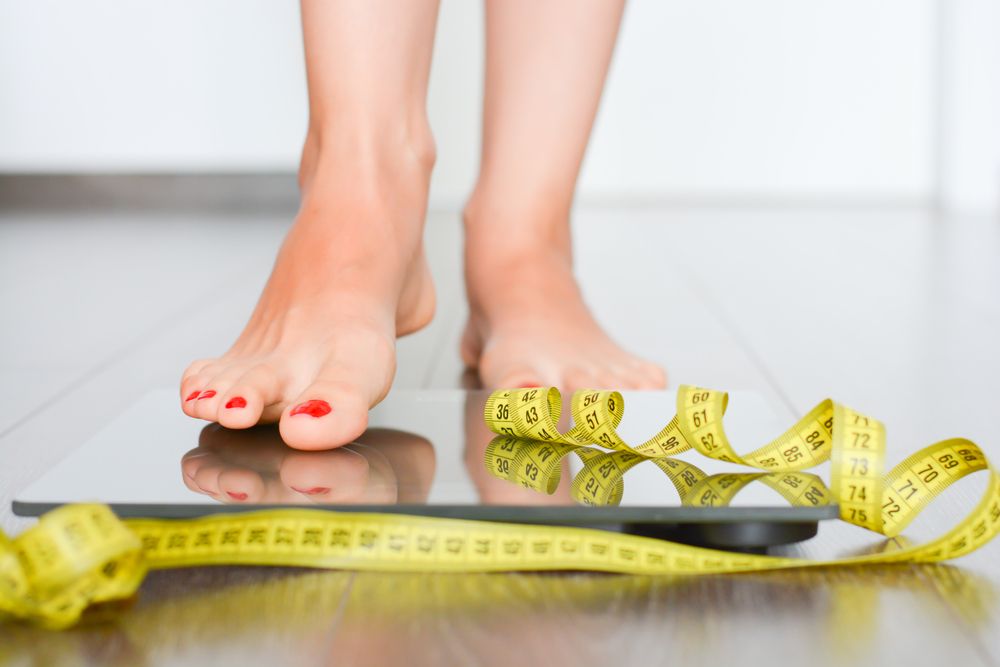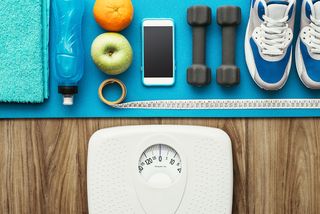
How to Lose Weight (and Keep It Off for Good)

Live Science is bringing our readers a monthly series of personal health goals, with tips and tricks we've gathered from the many health experts we've interviewed. Each month, we'll focus on a different goal, and the goal for January is Lose Weight. Follow us on Facebook and Twitter to connect with other readers who are working toward these goals.
Jump to: February — Eat Healthy | March — Start Exercising | April — Cope with Allergies | May — Protect Yourself from Sun and Heat | June — Stay in Shape Outdoors
If you're like many Americans, one of your New Year's resolutions is to shed some pounds. In fact, about a third of Americans say they want to make a commitment to lose weight in the New Year, according to a Nielsen survey from 2015. But starting a weight-loss regimen may seem daunting, particularly if you've tried in the past, only to see the weight come back later. Here, we've outlined some of the best tips for losing weight, including how to get started, stay motivated and keep weight off.
Why Lose Weight?

Obesity is known to increase the risk of many health conditions, including heart disease, high blood pressure, stroke, Type 2 diabetes, high cholesterol levels, cancer, osteoarthritis, sleep apnea and gallstones. But there's good news: Obese people who lose as little as 3 to 5 percent of their body weight can see improvements in their health.
More on obesity and health:
Sign up for the Live Science daily newsletter now
Get the world’s most fascinating discoveries delivered straight to your inbox.
- Small Weight Loss Leads to Big Health Gains
- 5 Ways Obesity Affects the Brain
- Even Temporary Weight Loss Can Have Heart Benefits
- Weight Loss Improves Sex
- Obesity's Toll: 11 Million Doctor's Visits Yearly
How to Get Started

Although there's no single "best" way to lose weight, a successful weight-loss program usually involves cutting back on your calories, increasing your physical activity and making behavioral changes to help you stick with a diet and exercise regimen over the long term. Here's how to get started:
1. Take a close look at your current lifestyle.
Before you start, try keeping a food dairy.
2. Set a realistic goal.
Doctors generally recommend that people aim to lose 5 to 10 percent of their body weight over six months. You should expect gradual, steady weight loss, but not immediate results.
3. Calculate your caloric intake.
To lose weight, you'll need to consume fewer calories than you burn. The exact number will depend on your current weight and activity level, but generally, people should aim to cut 250 to 1,000 calories from their diet per day in order to lose 0.5 to 2 lbs. (0.2 to 0.9 kilograms) per week. There are calculators available to help you determine how many calories you should consume per day.
4. Eat foods that keep you full.
Some experts recommend a low-glycemic diet that's high in protein, fiber and healthy oils, and low in starches and other sugars. This diet may help combat feelings of hunger.
5. Get moving.
You should aim to meet physical-activity guidelines of at least 150 minutes of moderate physical activity (such as brisk walking) every week. But you can break this down into short bouts of exercise, such as three 10-minute walks per day.
6. Monitor your progress.
You should keep track of your progress toward your goals and tweak them if needed. For example, you may want to use a pedometer or other device to keep track of how far you're walking.
More Tips:
- The Best Way to Lose Weight Safely
- How to Track Food Intake with Less Fuss
- 4 Calorie-Cutting Tips That Won't Leave You Hungry
- Why High-Fiber Diets May Help Weight Loss
- Will Staying Hydrated Help with Weight Loss?
- How to Start an Exercise Routine and Stick to It
When the Going Gets Tough

It can be difficult to stay motivated throughout the year, but here are some tips for when the going gets tough:
- If you fall behind on exercise, try setting a specific goal, such as running or walking a 5K. It also may be a good idea to exercise with a friend because it holds you accountable.
- Tricks such as using smaller plates and tall, narrow glasses can also help you eat and drink less without consciously thinking about it, studies have shown.
- Make sure you get enough sleep. Getting too little sleep may increase levels of an appetite-stimulating hormone called ghrelin and decrease levels of the hormone leptin, which makes you feel full, according to the National Institutes of Health. This may lead to an increase in hunger and make it harder to stick to a diet.
More Tips:
- 13 Kitchen Changes That Can Help You Lose Weight
- 7 Diet Tricks That Really Work
- Do Thinner Friends Help You Lose Weight?
- The Surprising Things You Shouldn’t Say to Someone Who’s Lost Weight
Gear That Can Help

Everyone's weight-loss journey is different, and you shouldn't think you need any particular gadget or gear to lose weight. That said, here are some tools that may be helpful for some people:
- Fitness trackers: These gadgets — which track steps, calories burned and a slew of other metrics — may help with weight loss and provide extra motivation for some people. Here are some of the best trackers, as reviewed by our sister site Tom's Guide: Best Fitness Trackers 2016.
And if you're new to the gym, check out our list of weird gym equipment, so you know a kettlebell from a Bosu ball.
Infographic: Weird Gym Equipment

All About Weight-Loss Programs

There is no "best" method for losing weight; what works for you might not work for someone else. Some people find it helpful to join an official weight-loss program. But of all the weight-loss programs out there, are some better than others?
A study published in 2015 found that, out of 11 weight-loss programs, only two were linked with a significant amount of weight loss that people kept off for a year: Weight Watchers and Jenny Craig.
Recently, researchers have found that a therapy called Acceptance-Based Behavioral Treatment (ABT)may help with weight loss. This therapy involves learning to accept uncomfortable feelings, such as fatigue and urges to eat. Those who learned ABT lost more weight, and kept it off longer, than those who underwent a standard obesity treatment.
The amount of weight you lose also may depend on your genes. A recent study found that people's genes predicted whether they lost weight during a weight-loss program.
More Info:
- Virtual Weight Loss: Online Meetings Yield Healthy Results
- Weight-Loss Programs Work for Severely Obese
- Hungry for More: What Weight-Loss Apps Are Missing
Tips to Keep the Weight Off

For many people, losing weight is only half the battle — the bigger challenge is keeping the weight off over the long term. And it's no surprise that keeping weight off is difficult — studies have shown that the brain and the body are hardwired to regain lost weight. But don't despair: Research also has revealed that people who are successful in keeping weight off share some habits. They tend to do the following:
- Engage in high amounts of physical activity — more than 200 minutes of moderate-intensity activity per week.
- Watch less than 10 hours of TV per week.
- Consume 1,380 calories per day, with less than 30 percent from fat.
- Eat the same foods regularly, without "splurging" on high-calorie foods on the weekends.
- Weigh themselves at least weekly.
- Engage in high amounts of light activity (like taking a stroll around the office), and sit less.
More Info:
- Here's Why It's So Hard to Maintain Weight Loss
- Aerobic Exercise: Everything You Need to Know
- 5 Tips for Sitting Less During Your Work Day

The Lowdown on Weight-Loss Supplements and Prescriptions
There's no magic pill for weight loss, and people should be wary of any over-the-counter supplements that claim to help you shed pounds. These supplements can be dangerous because they can contain ingredients not listed on the label. A 2015 study found that weight-loss supplements send more than 4,600 people to the ER every year in the United States.
In contrast to supplements, weight-loss drugs (including prescription pills) have more scientific evidence supporting their use. The makers of these drugs must conduct studies showing that the drugs can lead to weight loss before they can be approved by the Food and Drug Administration. However, these drugs still need to be used along with diet and exercise measures for people to achieve a meaningful amount of weight loss. You should also keep in mind that the long-term safety of these drugs has not been well studied.
More Info:

- Weight Loss Drugs: Pros and Cons of 5 Approved Prescriptions
- Weight-Loss Supplement Linked to Liver Failure Case
- Herbal Weight-Loss Supplements Loaded with Illicit Drugs
Original article on Live Science.

Rachael is a Live Science contributor, and was a former channel editor and senior writer for Live Science between 2010 and 2022. She has a master's degree in journalism from New York University's Science, Health and Environmental Reporting Program. She also holds a B.S. in molecular biology and an M.S. in biology from the University of California, San Diego. Her work has appeared in Scienceline, The Washington Post and Scientific American.
Most Popular




